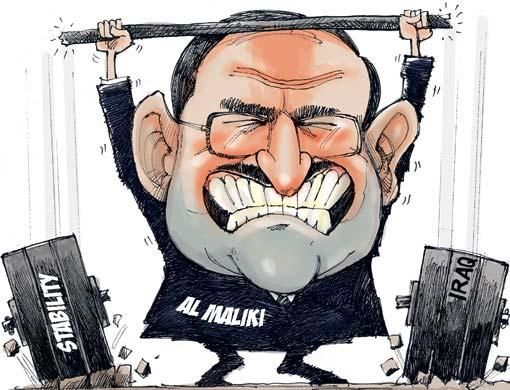Popular culture in the Arab street says that what is happening in Iraq is exactly what the Americans wanted for the Iraqi people; chaos and civil war. I tend to disagree, believing that the US administration is just desperate - practically dying - for a "success story" in Iraq.
That explains all the festivity recently shown by the Bush White House over the relative stability achieved in the Anbar province, where Sunni tribesmen are being armed by the Americans to combat Al Qaida.
The Americans would love to wake up the tomorrow and find peace and security in Iraq, with a booming economy and a healthy political system. They would then be able to tell the world: "See! We were right all along!"
While the line between success and failure is quiet clear for the US administration, it doesn't seem so visible for Iraqi Prime Minister Nouri Al Maliki. Last week, he gave an exclusive interview to Al Arabiyya TV talking about all that has been achieved in Iraq in terms of security since he assumed power in May 2006 - glossing over the 100 killed per day in Al Maliki's Iraq.
The militias are no longer a threat, he noted, adding that people no longer fear armed groups such as the Mahdi Army. Reconciliation was at its best, and Iran had no influence in the political party life of Baghdad.
Al Maliki was saying that with a straight face; either convinced that he was 100 per cent telling the truth, or convinced that his audience - viewers of the Arab world - were imbeciles!
Worrying
After spending one year and a half in power, Al Maliki should start worrying about how history will label him. He knows, and so do the Americans, that he has been a horrible prime minister. Apart from the killing of Abu Musaab Al Zarqawi in June 2006, Al Maliki doesn't have a single "success story" to speak of.
He wanted history to remember him as the man to have brought democracy to Iraq and eradicated Al Qaida; the man who uplifted the Shiites of Iraq to right all the wrongs done to them by Saddam Hussain.
Instead, Iraqis will remember Al Maliki as a selfish, sectarian politician who divided the country as never before, between Shiites and Sunnis.
They will remember the death squads that flourished under his regime, the targeted assassinations of Sunni notables, and they will see him as a stooge of the Americans who was unable to fulfil any of the promises he made when coming to power in May 2006.
Al Maliki's problem is that his government is not constitutional, as his cabinet no longer represents all parties that are seated in parliament. Most of the 37 ministers have walked out, then came the resignation of nine senior officers from the Iraqi Army, including Baker Zebari, the commander-in-chief. All of them were objecting to how the prime minister is running affairs.
Rather than do the impossible to keep the Sunni ministers, Al Maliki accepted their resignations by "firing" them last week. He added insult to injury on November 11 by insisting to carry out an execution verdict for Sultan Hashem, the former defence minister under Saddam and a leading Sunni personality.
Now, Al Maliki is in danger of taking a drastically wrong decision, given the standoff between his country's Kurds and the Turkish Government. He has been flirting with Kurdish leaders Masoud Barazani and Jalal Talbani for some time, seeking their political support in exchange for his backing for a referendum in Kirkuk to transfer its authority to Iraqi Kurdistan.
That referendum, if implemented, would enrage Iraq's Sunnis, its Arab nationalist Shiites, its seculars, the entire Arab neighbourhood and Turkey.
Last week, at an Istanbul Conference over Iraq, Iranian Foreign Minister Manouchehr Mottaki urged the Iraqi government to postpone the referendum, fearing that this would give the Kurds unconditional access to the 10 billion proven oil reserves beneath Kirkuk.
Al Maliki now faces a dilemma, however, since in as much as he needs to please the Kurds, to keep his shaky coalition alive, he does not want to say "no" to the Iranians. The referendum is supposed to take place before December 31.
Dilemma
Watching and hearing all of the above - and taking sides - is Al Maliki. The Shiites of Iraq are generally in a dilemma with the Kurds. The Kurds are overwhelmingly pro-American, with an alliance with the United States that dates to the 1970s.
The Shiites are not particularly pro-American, with exception of leaders such as Abdulaziz Al Hakim. One thing that brings some Shiites closer to the Kurds is the issue of autonomy. Certain Shiite groups, headed by the Supreme Islamic Iraqi
Council (SIIC) have repeatedly called for creating an autonomous Shiite district in southern Iraq, similar to the Kurdish one in the north. When that plan materialised thanks to the Biden Plan earlier this summer, SIIC distanced itself from it, under orders from Al Maliki, and sided with the loudest opponent to the federalism plan: Moqtada Al Sadr.
Al Maliki, who faces tremendous pressure for his repeated failure to bring stability to Iraq and disarm the militias, has one of two choices. Either he has to reconcile with the Sunnis, which is difficult given his sectarian upbringing (despite US pressure), or part the Kurds to avoid a war with Turkey.
Making friends with both, or continuing to alienate both, is impossible. Relying on support within his Shiite community is no longer enough, especially since many parties in the all-Shiite United Iraqi Alliance have started to lose faith in his leadership.
In another gesture, Moqtada Al Sadr came out recently in favour of reconciliation with Iraqi Sunnis, something that is very difficult but which if it happens could give a great boost to Al Maliki's standing in Iraqi domestic politics.
A stronger Al Maliki means stronger support for the Kurds and the Shiites.
Sami Moubayed is a Syrian political analyst.













